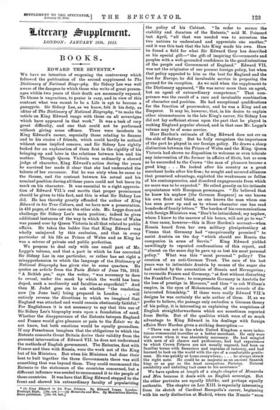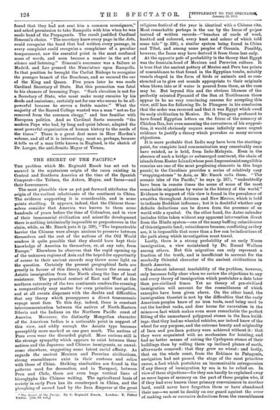BOOKS.
EDWARD THE SEVENTH.*
WE have no intention of reopening the controversy which followed the publication of the second supplement to The Dictionary of National Biography. Sir Sidney Lee was well aware of the dangers to which those who write of great person- ages within two years of their death are necessarily exposed. To blame is ungracious, to praise is easy, and in view of this contrast what was meant to be a Life is apt to become a panegyric. Sir Sidney Lee, as we know, felt it his duty, as lditor of The Dictionary of National Biography, "to make the article on King Edward range with those on all sovereigns which have appeared in that work." It was a task of very great difficulty, and one that could not be performed without giving some offence. There were incidents in King Edward's career, especially those relating to finance and to his choice cf friends, which could hardly be noticed without some implied censure, and Sir Sidney Lee rightly looked for an explanation of them first in the rigidity of his bringing-up and later in the relations between him and his mother. Though Queen Victoria was ordinarily a shrewd judge of character, King Edward's action during the years he survived her made it clear that she had underrated the talents of her successor. But he was sixty when he came to the throne, and the contrast between his actual and his nominal position during all these years could not but leave its mark on his character. It was essential to a right apprecia- tion of Edward VII.'s real merits that proper prominence should be given to this fact, and this is what Sir Sidney Lee did. He has thereby greatly offended the author of King Edward in his True Colours, and we have now a presentation, in 416 pages, of the case on the other side. Mr. Legge does not challenge Sir Sidney Lee's main position; indeed he gives additional instances of the way in which the Prince of Wales was passed over by Queen Victoria in all that related to public affairs. He takes the bolder line that King Edward was wholly uninjured by this exclusion, and that in every particular of his life as Prince of Wales and as King he was a mirror of private and public perfection.
We propose to deal only with one small part of Mr. Legge's volume, and that a part in which he has corrected Sir Sidney Lee in one particular, or rather has set right a misapprehension to which the language of the Dictionary of National Biography has given rise in some quarters. He quotes an article from the Paris Eclair of June 7th, 1912. " A British pen," says the writer, " was necessary to dare to reveal, under the mask by which the world has been duped, such a mediocrity and faculties so superficial." And then M. Judet goes on to ask whether "the resolution now [in June last] being prepared in London . . . will entirely reverse the directions to which we imagined that England was attached and would remain obstinately faithful." For Englishmen it is not necessary to say that this use of Sir Sidney Lee's biography rests upon a foundation of sand. Whether the disappearance of the Entente between England and France would give pleasure or pain to the Eclair we do not know, but both emotions would be equally groundless. If any Frenchman imagines that the obligations to which the Entente commits Great Britain derive their validity from the personal intervention of Edward VII. he does not understand the methods of English government. The Ententes, first with France and then with Russia, were the work not of the King but of his Ministers. But when his Ministers had done their best to knit together the three Governments there was still something that was beyond them. They could recommend the Entente to the statesmen of the countries concerned, but a different influence was needed to recommend it to the people of those countries. It was here that King Edward stepped to the front and showed his extraordinary faculty of popularizing • (1) King Edward in his True Colours. By Edward Legge. London: Eveleigh Nash.[168. net.]—(2) Monarchs end Men. By Harimilion Harden. Sarno publisher. [10s. 6d. net.]
the policy of his Cabinet. " In order to secure the
stability and duration of the Entente," said M. Poincar6 last April, "all that was needed was to accustom the two nations to understand and appreciate one another," and it was this task that the late King made his own. Hero
he found a field for what Sir Edward Grey has described as his special gift—" the gift of inspiring Governments and peoples with a well-grounded confidence in the good intentions of the people and Government of England." Edward VII. was not the originator of our present foreign policy, but when that policy appealed to him as the best for England and the best for Europe, he did invaluable service in preparing the ground for its reception. As we said when the supplement to the Dictionary appeared, "He was never more than an agent, but an agent of extraordinary competence." That com- petence was the result of a rare and invaluable combination of character and position. He had exceptional qualifications for the function of peacemaker, and he was a King and an Emperor. It may be, however, that, in his desire to explain other circumstances in the late King's career, Sir Sidney Lee
did not lay sufficient stress upon the part that he played in making England popular abroad, and in that case Mr. Legge's
volume may be of some service.
Herr Harden's estimate of King Edward does not err on the side of flattery. But he fully recognizes the importance of the part he played in our foreign policy. He draws a sharp distinction between the Prince of Wales and the King. Queen Victoria bad shown no disposition to welcome or even tolerate any intervention of the former in affairs of State, but as soon
as he succeeded to the Crown "the man of pleasure became a good king.. . . He looked after his country as a great merchant looks after his firm; he sought and secured alliances that promised advantage, exploited the weaknesses or follies of his contemporaries, and dissolved engagements from which
no more was to be expected." He relied greatly on his intimate acquaintance with European personages. " He believed that he knew his nephew [the German Emperor] as one knows his own flesh and blood, as one knows the man whom one has seen grow up and as to whose character one has read hundreds of family letters." The burden of his communications with foreign Ministers was, "Don't be intimidated; my nephew, whom I know to the marrow of his bones, will not go to war." A time came, however—this is Herr Harden's account—when
Russia heard from her own military plenipotentiary at Vienna that Germany had "unequivocally promised" to assist Austria on the day " which should see Russia the
companion in arms of Servia." King Edward yielded unwillingly to repeated confirmations of this report, and
" almost on the same day he gave up as lost his most personal policy." What was this " most personal " policy P The creation of an anti-German Trust. The care of his last
years was to intimidate Austria by means of the anger she had excited by the annexation of Bosnia and Herzegovina; to reconcile France and Germany, " at first without disturbing the Frankfort Peace ; to compensate Germany in Anatolia for the loss of prestige in Morocco," and thus " to rob William's
empire, in the eyes of Mohammedans, of its aureole of dis- interested friendship." If these were really Edward VIPs
designs he was certainly the sole author of them. If, as we prefer to believe, the passage only embodies a German theory of his policy, it is interesting as explaining the suspicions of English straightforwardness which are sometimes reported from Berlin. But of the qualities which were of so much advantage to King Edward in his dealings with foreign affairs Herr Harden gives a striking description :-
"There was not in the whole United Kingdom a more indus- trious commercial traveller or a better merchant. He only wore the crown when it was absolutely necessary. Ho had mingled with men of all classes and professions, had had experiences to which Crown Princes are not usually exposed, had been on familiar terms with financiers and captains of industry, and had learned to look on the world with the eye of a comfortable gentle- man. He was quickly at home everywhere ; . . . be always struck the right note. He could be as majestic as an ancient Spanish king or as gay as the least scrupulousParisian. Natural amiability and unfailing tact came to his assistance." We have spoken at length of a single chapter of Monarchs and Men because it deals with an English sovereign. But
the other portraits are equally lifelike, and perhaps equally authentic. The chapter on Leo XIII. is especially interesting from its sketch of Cardinal Rampolla's career, beginning with his early distinction at Madrid, where the Nuncio "soon
found that they had not sent him a common monsignore," and asked permission to take Rampolla with him when he was made head of the Propaganda. The result justified Cardinal Simeoni's choice. " The secretary knew every page in the Acta, could recognize the hand that had written every passage, in every complaint could recognize a complainer of a peculiar temperament, saw the essential point in the most confused mass of words, and soon became a master in the art of silence and listening." Simeoni's successor was a failure at Madrid, and Leo pressed the Nunciature upon Rampolla. In that position he brought the Carlist Bishops to recognize the younger branch of the Bourbons, and so secured the ear of the King and Queen. Five years later he was made Cardinal Secretary of State. But this promotion was fatal to his chances of becoming Pope. "Such elevation is not for a Secretary of State, who must make many enemies by his deeds and omissions; certainly not for one who seems to be all- powerful because he serves a feeble master." What the majority of the Sacred College wanted was a man " not so far removed from the common clergy," and less familiar with European politics. And so Cardinal Sarto succeeds "the modern Pope who bad, by long and quiet labour, adapted the most powerful organization of human history to the needs of the times." There is a great deal more in Herr Harden's volume, and all of it is interesting; most so, perhaps, because it tells us of a man little known in England, is the sketch of Dr. Lueger, the anti-Semite Mayor of Vienna.



























































 Previous page
Previous page